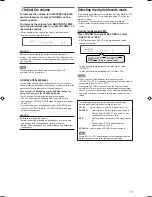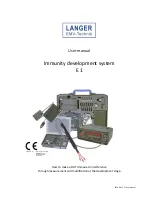
6
L
R
LS
RS
SB
C
SW
110V
127V
220V
230 -
240V
CAUTION:SPEAKER
IMPEDANCE 6 – 16
CENTER
SURROUND
SURROUND
BACK
SPEAKERS
LEFT
RIGHT
LEFT
RIGHT
FRONT
LINK-
III
OUT
SUB-
WOOFER
AV
COMPU
Connecting the speakers
Turn off all components before making connections.
1
Twist and remove the insulation at the end of each
speaker cord.
2
Press and hold the clamp of the speaker terminal
(
1
), then insert the speaker cord (
2
).
• For each speaker, connect the (+) and (–) terminals on the
rear panel to the (+) and (–) terminals marked on the
speakers.
3
Release the finger from the clamp.
CAUTIONS:
• Use speakers with the SPEAKER IMPEDANCE indicated by the
speaker terminals (6
Ω
– 16
Ω
).
• DO NOT connect more than one speaker to one speaker
terminal.
Connecting the speakers
Do not connect the AC power plug to the wall outlet until all connections are completed.
Speaker Layout Diagram
Powered
subwoofer
(SW)
Connecting the powered subwoofer
By connecting a subwoofer, you can enhance the bass or
reproduce the original LFE signals recorded in digital software.
Connect the input jack of a powered subwoofer to the
SUBWOOFER OUT jack on the rear panel, using a cord
with RCA pin plugs (not supplied).
• Refer also to the manual supplied with your subwoofer.
After connecting all the speakers and/or a subwoofer, set the
speaker setting information properly to obtain the best possible
surround effect. For details, see pages 16, 17, and 21 to 23.
NOTE
You can place a subwoofer wherever you like since bass sound is
non-directional. Normally place it in front of you.
Left front speaker
(L)
Right surround
speaker (RS)
Left surround
speaker (LS)
Center speaker (C)
1
2
1
2
3
Surround back
speaker (SB)
Right front speaker
(R)
EN06-11RXF31S[UJ]2.p65
05.5.13, 16:56
6
















































